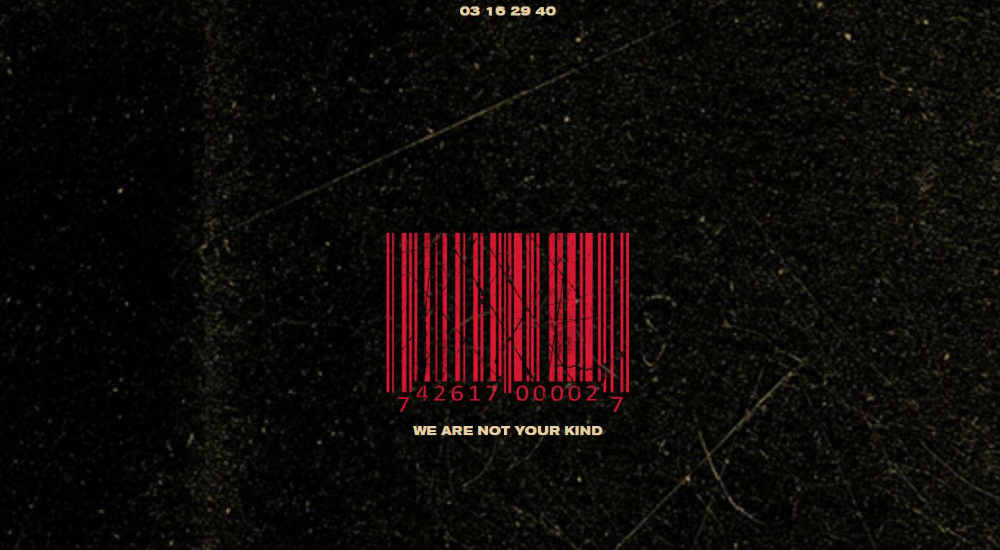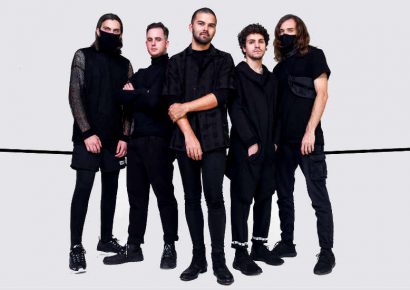The title comes from the 2018 single, ‘All Out Life’. Despite not appearing in the track list, the song acts as a prologue to the record. The lyrics address the prevailing compulsion to discard or shun anything from the past as soon as a new trend emerges. In response to this conduct, Slipknot raises nine proverbial middle fingers.
“Slipknot business is Slipknot business and people follow our trends,” says percussionist and backing vocalist, M. Shawn Crahan AKA Clown. “We live in a very sensitive world and maybe we live in a world that a lot of subjects need to be addressed, but we really put up a lot of barriers for real emotions. So I feel it’s just easier, once again, for us to say, we are not your kind. If you want to sit around and judge me and you want to bring conflict and drama, hey, I’m not for you. I don’t need your support.”
These might sound like the words of a middle-aged man worried about becoming irrelevant, but the themes covered in ‘All Out Life’ are nonetheless valid. It’s naïve to dismiss the merits of past achievements once something shinier appears, and understanding the foundations of any artform allows for a deeper connection.
The song also draws attention to a conundrum many songwriters face: trying to keep on moving forward, but not quite abandoning what’s worked for them in the past.
“It can be quite difficult to get caught up in ‘are we evolving? Are we not evolving?’” Crahan says. “A very crucial ingredient in creating art is to be able to know when to commit, when to back off, when to shut up, when to be selfless, when to know that someone else is coming up with something that suits the song better.
“We’ve all joined forces to do this artform called music and with it comes a sharing experience. And then there’s arrangement and agreement, and the arrangement most of the times is based off a flow and what feels certain. It’s quite a process.”
We Are Not Your Kind arrives nearly five years after the band’s previous record, .5: The Gray Chapter, which followed the death of founding bassist Paul Gray. It’s the longest period the band members have spent working on new music. Six albums into a successful career, the process certainly hasn’t become effortless.
“When I approach a song, every day it’s going to grow and every day I’m going to take it as serious as it is,” says Crahan. “I’m not going to mess around. I’m going to wake up tomorrow and go, ‘Oh the song has grown. Where am I at with it now?’ And that’s not going to stop until everything is overturned and everyone’s happy and everyone’s contributed.
“It can be very confusing to buy into your own politics and your own artform. I think when you buy into the fact that you think you’re an artist, you may not have anything left to create. I’d much rather not be called an artist. I’d much rather constantly, blindedly go where I’m choosing to go for reasons unknown. I’m moving in a forward direction without any understanding of the outcome.”
It’s easy for Crahan to espouse the virtues of this intuitive method given his band’s unflagging popularity. Slipknot have enjoyed immense commercial success throughout their 20 year career; The Gray Chapter hit number one in the US, Australia, Japan, Canada and Switzerland and reached the top ten in most other major territories. A quick look at the streaming figures shows the band’s audience has eagerly devoured both ‘Unsainted’ and the follow-up single, ‘Solway Firth’.
“I’ve always believed that the reason why we have as many fans as we have is because people need people to trust,” Crahan says. “And we don’t have anything to prove to anyone but ourselves. You may not like what I’m choosing to do, but I know you love the fact that I can make a choice for myself and stick to it without worrying about what the fuck you think. That’s a pillar in our camp, in our religion.”
Slipknot’s fanbase stretches across generations. They’ve retained a core listenership since releasing their self-titled debut in 1999 and continue to appeal to younger listeners navigating their formative years. This isn’t a consequence of actively targeting a youth audience, however.
“Music to me is god and my god doesn’t see colours or shape,” Crahan says. “It’s just vibration and energy, as weird as that sounds. We just be ourselves and in the end, yeah, there might be a song that’s out there in theory or concept or subject matter, and it very well could be not suitable for a younger mind. But that’s what good parents are for, to be able to jump in and decipher what this intellectual thought is.
“It’s better not to wonder who gets it or what demographic or what skin colour or whether you’re an alien or from this planet. It’s just better to create for oneself and then see how it flies with the rest of it and then just deliver it to this fucking thing called the human race.”
We Are Not Your Kind is the second Slipknot album to feature drummer Jay Weinberg and the first since the official induction of bass player Alessandro Venturella. It also comes just months after the controversial departure of percussionist Chris Fehn, who had been with the band since 1998. Despite the various disruptions, Crahan doesn’t mince his words when appraising the album’s quality.
“This album is a masterpiece in my mind, but you can only make a masterpiece by making brilliant pieces of work. We evolve every time. We keep going and going. I just think every album we make is a reflection that we’re still strong and we’re still learning. When you hear it, it doesn’t matter if there’s a choir in the song, you just hear that noise and you’re like, that’s fucking Slipknot. We’re not anybody else’s genre but our own.”
We Are Not Your Kind, the new album from Slipknot, hits shelves on Friday August 9 via Roadrunner Records / Warner Music Australia. Catch Slipknot on tour with Metallica this October.

